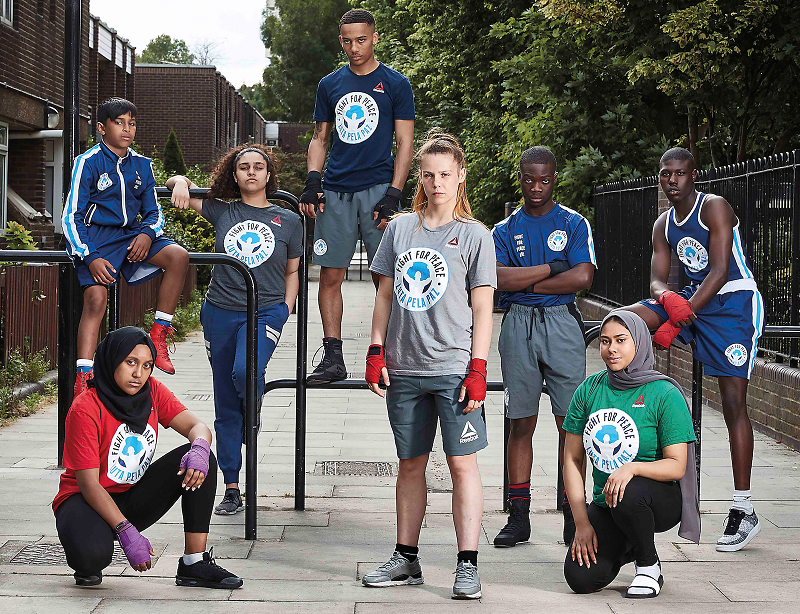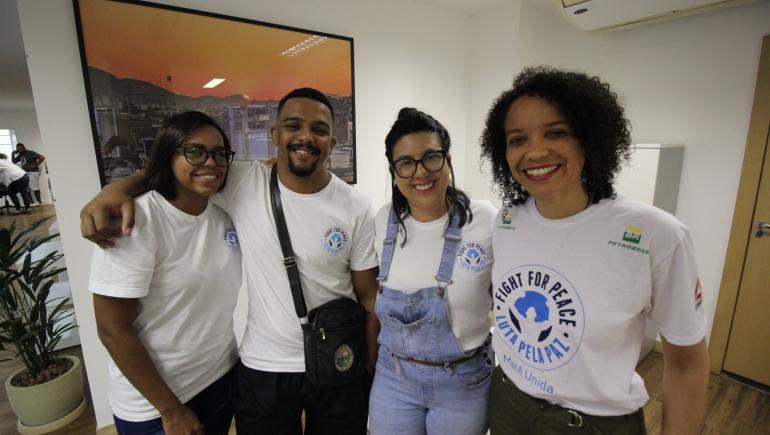Each month the Sport for Development Coalition presents a monthly theme, and for July 2020 we welcome Jenny Oklikah (pictured above, right), the new Chief Executive Officer of Fight for Peace. Here Jenny talks about the work of the charity, and the challenges and opportunities presented at this time of change for society. Join Jenny for a live Twitter takeover at the hashtag #SportForDevelopmentCoalition on Monday 27th July (8-9pm).
The ongoing obstacles and acute hardships presented by the Covid-19 pandemic and the growing movements against the injustice, prejudice and systemic racism that exist in our society, mark this moment out as unique in our lifetime, and certainly in the 20-year history of Fight for Peace. This moment brings with it significant challenges as well as vital opportunities, both for us as an organisation and for the wider youth and sport for development sectors.
From London to Rio de Janeiro, to Kingston, Jamaica, and across the 17 countries in which our Fight for Peace Alliance partners operate (including 46 organisations in the UK), we work in communities which face disproportionate socio-economic barriers that are significantly heightened by the Covid-19 pandemic. For young people and families in our communities, daunting new and existing obstacles will need to be confronted and overcome in the coming weeks and months as we emerge from lockdown and, in some places, continue to battle the spread of the Coronavirus.
RECOGNITION
Families and young people with whom we work have been dealing with financial hardship, reduced income and unemployment, bereavement, domestic violence and missed schooling over a number of weeks. This presents very real threats to the development, and physical and mental health of our members, and can force those most vulnerable into difficult choices with negative outcomes for themselves and others.
The hardships are set to continue as the longer term social and economic impacts of Covid-19 are felt, and mitigating them through ongoing social support, delivery of food and essentials, and alternative programme delivery will continue to be the focus of our work, both locally and globally.

The enhanced awareness of the discrimination and injustice which exist in our society also marks this moment out as unique. Recognition of these issues is long overdue. No-one should be held back, much less suffer abuse or violence, because of the colour of their skin, their sexuality, their gender identity, or disability - nor should they face added barriers where these intersect. For us, oppression and injustice are destructive barriers that stand in the way of our young people realising their full potential. Fight for Peace, and the wider youth and sport for development sectors, must be part of the solution.
For us this means two things. Firstly, it means going beyond mitigating and combatting the effects of oppression through our work with young people by using our voice and influence to highlight injustice and advocate for change. Crucially, it also means looking inward and assessing how we address and deal with these issues, how we can make them even more central to our work, how our young people and staff can most effectively discuss and educate themselves and each other, and how we can best reflect progression and change.
STRATEGIC
This week we took an exciting initial step in this process when we announced the creation of a new Leadership Group, not based on hierarchy but composed of leaders from across our organisation who will influence the strategic direction and decision-making of the next phase of Fight for Peace’s history, and that crucially represent the diversity of our staff and young people. We believe that setting an example for good practice within our sector and networks is arguably the greatest and most important influence we can have.
We have always been an organisation that has championed collaborative working and we believe that now more than ever partnership, knowledge and skills exchange, and collective impact will be vital. Fortunately, the nature of our global work is well set up for this and is developing all the time. Through the best practice exchange occurring across our global Alliance of 135 organisations and our established and emerging networks using collective impact methodology in Kingston (Jamaica), Maré (Rio de Janeiro) and Newham (London), we are able to draw on the vast knowledge of our partners, train and help develop fellow organisations, and work collectively to best meet the needs of the young people and communities we serve at this crucial time.
In 20 years Fight for Peace has never stood still, and this moment of change must be grasped as another opportunity to evolve - to adapt to best support our young people and communities, to champion change in the way society perceives and embraces young people, and promote even greater unity and solidarity in our continued fight for peace.
Join Jenny for the live Twitter takeover at the hashtag #SportForDevelopmentCoalition on Monday 27th July (8-9pm).
Pic credit: Dolly Clew.













